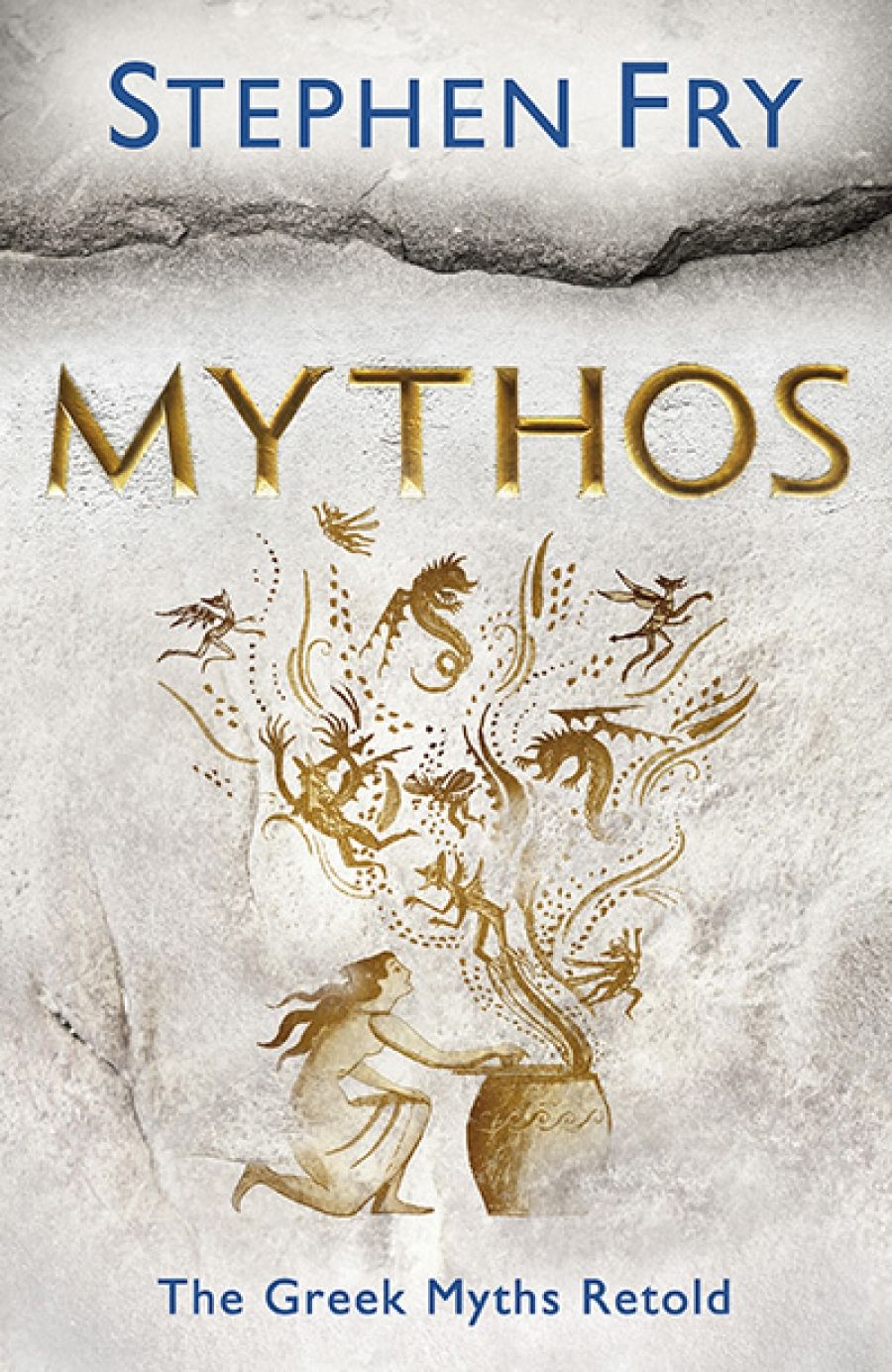
- Free Article: No
- Contents Category: Classics
- Custom Article Title: Julia Kindt reviews 'Mythos' by Stephen Fry
- Custom Highlight Text:
The ancient Greek gods were a rowdy bunch. Adultery, theft, blackmail, and lies are all on the record, as are the usual confrontations between siblings, ranging from harmless banter all the way to aggravated assault – and worse. In short: rather than paragons of exemplary behaviour, Zeus, Hera, Apollo, and Aphrodite ...
- Book 1 Title: Mythos
- Book 1 Biblio: Michael Joseph, $32.99 pb, 430 pp, 9780718188740
Stephen Fry’s Mythos offers a fresh retelling of the old stories. His book takes the reader on a wild ride from primordial chaos and the creation of the cosmos to the full-blown Greek pantheon in all its glory. Along the way, we encounter Zeus, with his numerous extramarital affairs, as well as his wife Hera’s reactions. We come across Prometheus, who stole fire from the gods to give to humans, and Pandora with her infamous box. Fry guides us on this tour de force in his signature style, familiar from his many previous fiction and non-fiction books, with great virtuosity – and a good dose of British humour.
Fry’s storytelling is witty, vivid, and full of irony. It is especially in direct dialogue that the old gods come to life. Take the following exchange between the primordial deities Tartarus and Gaia:
‘Gaia, you’ve put on weight.’
‘You look a mess, Tartarus.’
‘What the hell do you want down here?’
‘Shut up for once and I’ll tell you …’
While this may be taking liberties with the ancient sources, it also enhances the spark and liveliness of the divine characters.
Greek myth can be a pretty messy affair. In the ancient world, there were competing strands of one and the same story – some in direct contradiction to each other – spread over different authors and genres, frequently with no particularly authoritative core. It is Fry’s signal achievement to have distilled a complex and potentially confusing body of evidence into a grand but accessible whole, with a coherent storyline.
What gets a bit lost, however, is the social, political, cultural, and religious function of the original stories. In the ancient world, myth was told and retold in different situations and for different purposes. Some explained the origins of certain institutions; others articulated contemporary problems and questions by displacing them into a timeless past. Even though Fry acknowledges this dimension, his retelling of the stories is largely free of such specific functions, ancient or modern.
The enduring relevance of the ancient Greek myths emerges in other ways. The book is full of references to modern culture both high and low: allusions to Shakespeare stand in juxtaposition to Monty Python. The sudden explosion of life in the cosmos after the gigantomachy is likened to exponential growth in computing capacity. With such references, the reader is constantly drawn into the story, asked to compare, to judge, and to take a stance, to draw multiple lines between seemingly unrelated situations. All this makes for a consistently good read. It also encourages us to think about how the old stories still speak to us today, what they offer in terms of timeless reflection on things human and divine.

The question brings us right to the core of human existence. As Fry states halfway through, ‘[W]hat we really discern is the deceptive, ambiguous and giddy riddle of violence, passion, poetry and symbolism that lies at the heart of Greek myth and refuses to be solved. An algebra too unstable properly to be computed, it is human-shaped and god-shaped, not pure and mathematical.’ In short: myth is about the mysteries that make up human life just as much today as they did back then. Myth allows us, if not to solve these mysteries, at least to visualise them.
The book ends with a short afterword and useful briefs about the nature of ancient myth, Greek culture and society, and the ancient and modern sources used in the book. It is illustrated with several maps and images of ancient artefacts and neoclassical representations of the classical stories. Perhaps inevitably, the expert might detect a few inaccuracies and shortcuts, or take issue with the presentation here and there; but in the end this does not really matter. Overall this book is remarkably well researched. Moreover, the Greek myths have always been around to be told and retold with the ultimate purpose of having them speak to the present. Fry’s book does this skilfully, and in an informed, light-hearted way. Mythos ensures that these important tales live on to be appreciated for what they are: gripping, funny, and extremely versatile stories that tell us much about the ancient Greeks – and ourselves.


Comments powered by CComment